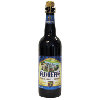Brasserie Lefèbvre - Floreffe Prima Melior
-
ABV:
8.00% -
Serving Temperature:
45-50° F -
Suggested Glassware:
Tulip, Snifter or Oversized Wine Glass
In terms of appearance, the beer has an almost cola-like look—deep brown with ruddy hues in the light and definitely on the darker side of the spectrum for a Belgian Strong Dark Ale. Giving a firm pour, the beer will be adorned with a pale tan head that begins to cling to the glass immediately as it decays. It greets the nose with a ton of complex esters and phenols. Look for notes of very young, under ripened apricots and plantains, a subtle mustiness and suggestions of saltiness and yeasty meatiness. Expect powdery, earthy hops and big yeast notes, with a fennel-like edge and a slightly medicinal herbal quality. Some implied astringency on the palate is suggested by the unripe fruit notes on the nose and gets delivered in the flavor profile. One of the key spices in the beer is anise, and a low-to-moderate level of licorice notes will grow as it comes up in temperature. Our first sips revealed tastes akin to very young, hard apricots, with suggestions of underdeveloped plums, dates and black licorice. The tartness is fairly sharp and generally similar to unripe stone fruits. Look for an interesting interplay between licorice-like character and yeasty spices, with some notes of red grapes, and a lingering stem-like woodiness, with a bit of a spice-and-yeast-induced numbing quality like you might expect from a chewed, mint-flavored toothpick. The grape-like notes and astringency do lend a vinous quality to the overall experience, with perhaps a very faint note of chocolate at full warmth. The alcohol is undetectable in the flavor, which is amazing really. How 8% ABV disappears into the void is mind-boggling. Were it not for a pleasing belly-warming sensation, you’d have no indication that this was a 16-proof beer. Overall, as the beer warms, the tartness levels out a bit and lets a subtle hop bitterness hold the sweetness in check, all with a bit of a tingle left on the palate from some unknown element—seems to be the combination of a very heavy hand on the coriander in the recipe, and the spicy byproducts of a very active yeast strain, with a bit of the anise’s aromatics brought into solution and essentially converted to liquid spice. The sensation reminds us of the tingling, slightly numbing experience you get when biting into orange peel. Quite a complex beer. We suggest pairing with a mature hard cheese such as cave-aged Gruyere, or citrus-braised, perhaps even stewed, rabbit in brown-sugar and spice reduction.
A stone quarry town since the late 1800s, Quenast, Belgium has long been a town where great thirsts beg to be quenched. In 1876, local gamekeeper, farmer, innkeeper and brewer Jules Lefèbvre answered the call to bring his town their own brewery. The Lefèbvre Brewery has been in near-constant operation since then, remaining a family-run craftsman business through six generations of Lefèbvre brewers. We say near-constant because in 1916, during World War I, the brewery was dismantled by order of the Germans, who commandeered its metals. But just after the war, in 1921, Jules's son Auguste set up shop in a new location, taking over a bankrupt brewery—and this is where the brewery remains to this day.
Along with Auguste, the 3rd generation of Lefèbvre brewers, Gaston Lefèbvre, entered the scene and oversaw various modernization projects that would allow for better production quality and an increase in beer volume. Even though elements were 'modernized,' beer was still made in a coal-fired kettle that used ambient wind currents from the valley below the brewery to control the intensity of the flames (that fire-fed kettle is still in use to this day). Unfortunately, as World War II did for so many breweries throughout Europe, operations were again jeopardized. Thankfully, this time around, the brewery was not dismantled, but it was dealt a blow by being restricted to producing only a 0.8% alcohol beer until about 1945.
Pierre Lefèbvre, 4th generation family brewer, took up the reigns from 1960 until 1975, when the torch was passed again to his son Philippe Lefèbvre. The 6th generation of Lefèbvre brewers, Paul Lefèbvre, joined the team in 2002. Today, under Paul's stewardship, this family brewing operation produces a wide range of different beers, from traditional witbiers to honey-laced lagers to Abbey Ales to various fruit beers including Kriek (cherry), Pèche (peach) and Framboise (raspberry). While we find their beers to be quite refreshing, we believe that their traditional, family-run business model is equally so! For more information about the brewery check out their website at www.brasserielefebvre.be.

Unmatched Variety by style, brewery & country
Choose from Five different Beer Clubs offering unmatched variety by brewery,
country of origin, and beer style to suit your specific tastes.


